WRITE, WRITE, WRITE. Alumni/Faculty Spotlight: Julia Prescott (BA/FS ‘13)
January 20, 2021
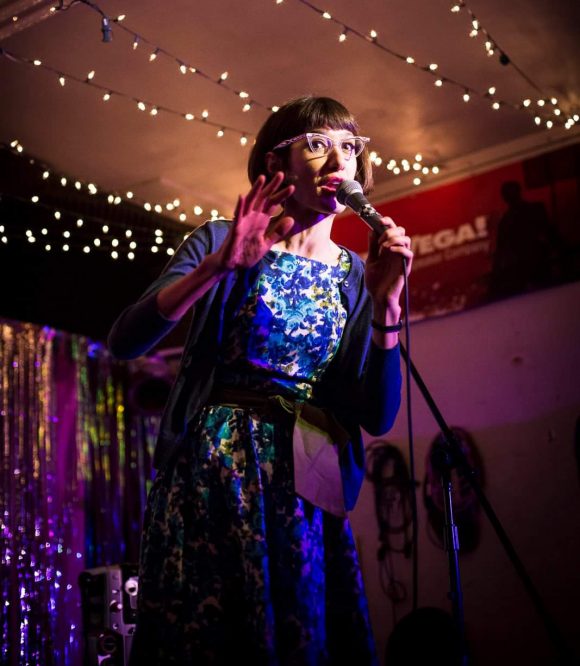
Julia Prescott is a hilarious screenwriter and comedian, who since graduating from Chapman in 2013 has written for major studios, toured as a stand-up comedian, created the hit series Townies, and more. She recently returned to Chapman and joined the faculty this fall as a part-time lecturer teaching the course Writing for Animation. We were lucky enough to hear from Julia about what she’s been up to in the comedy world and what she’s learned along the way.
What has your career path been like and how did you get to where you are now?
This is a very BIG question (but it’s a good question!). I’ll try my best to answer as honestly as I can — in truth, my career’s been a lot of starts and stops! This is the case for the majority of professional writers (the maxim “feast or famine” is incredibly true). Even “bigtime writers” on bigtime SitComs will have inconsistencies between jobs because there are just so many variables at play.
I should say that I got an incredibly lucky break early on — when I was still an Undergrad student at Chapman, I was interning every chance I got. One of the internships was at Warner Bros during their summer term. I had just started taking Anne Beatts’ “Sketch 101” class and was beginning to develop a bit of a writing packet — nothing to write home about, but enough of a pile of work that I felt proud to say it was “my voice”. That, along with writing 5 minute “pilots” for Channel 101 were all I had to my name as “my writing” besides college papers. I knew I wanted to become a comedy writer, but didn’t necessarily know which path was “the right one” (and honestly, like all aspiring comedy writers, I was just so desperate to say “WRITER” on my tax forms that I was open to literally any door that would open).
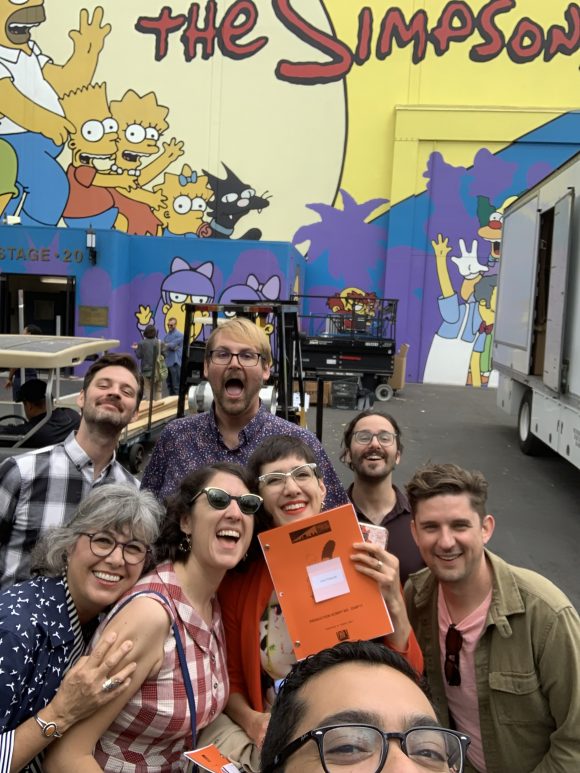
Table read of the “Treehouse of Horror” episode of The Simpsons, written by Julia.
So I’m interning at Warner Bros — in their Post-Production dept if my memory serves. The furthest from a TV writer’s room I could be (literally — the writers are the START of the process and we were the END). It wasn’t even in TV, but focused mainly on whatever Batman movie they were working on at the time. I had the great luck of being assigned a mentor (Lisa Gregorian, one of the best people to ever do it) and started to make it clear that comedy and writing was my goal. She graciously set up a meeting with Christopher Mack, the then-head of the Warner Bros Writing Workshop (a program that WB and the other major studios have to assist aspiring writers to get staffed on major shows).
I was about to enter my senior year of school — barely 20-something — I walked into Chris’s office thinking “this is it, I’ve made it” and the first thing he said to me was, “First of all, you’re far too young to even be considered for the writers workshop.” I hadn’t even sat down on his office couch yet. This happened when I was still in the doorway. But, being a semi-skilled improviser, I rolled with it and said, “Hey, that’s fine, we’re just talking.” It ended up being the best meeting of my life. All of the pressures of trying to “impress this guy” dissolved because we just got down to it — I described my silly sketches I wrote in Anne’s class and my Channel 101 pilot about an alcoholic time-traveling Abe Lincoln who becomes my college roommate (listen, the early ’00s were another time). I ended up accidentally giving the best job interview of my life just laying out all the weird things I thought were funny. At the end of the meeting, Chris leaned in and said, “Ya know, there might be something I have for you…” That ended up being a staff writing job on MAD for Cartoon Network — which I started some weeks before I even hit the Chapman graduation stage.
Something I wanna highlight here is that my path from MAD wasn’t set from there on out. The show ended and I didn’t have a manager or agent to help me navigate the next chapter. I was in my early 20’s and even though I had been staffed as a professional writer, I was still green as hell. Working on one animated sketch show does not a “great writer” make and even though I impatiently wanted to hit the ground running and amass my empire, that simply wasn’t in the cards.
I’ve always been the kind of person who refuses to stay down. To my mother’s chagrin when I was a kid, I was always trying another angle. Another answer. Another way to find the path to get what I wanted. I’m also extremely conflict-averse, so this isn’t a “move fast, break things” Silicon Valley tech bro kind of story. It was more a meditation on how I was gonna control what I could control and not get down and out that my first professional writing job seemed to fizzle without a second chapter. So I kept writing. Pilot after pilot after pilot. I tried out those silly Channel 101 pilots I wrote in college. I made some! They got into the screening and I started to meet other creatives like me. I got serious about stand-up! I started producing and hosting my own shows to meet other comics. I went to open mic after open mic and sharpened set after set. I got hired on little gigs here and there! I was ready with my writing packet that I was constantly polishing and re-polishing. I took Sketch 101 classes at UCB (RIP). I stayed up all night and wrote specs to submit to the writing fellowships (not just for WB but for Disney and FOX and NBC and CBS and Nickelodeon and literally everywhere I could submit to). I started writing groups. I ended writing groups. I started some more. I took sooooooooo many supplemental writing classes at places like iO West and UCB (again, RIP). I went on stand-up tours (5!). I traveled the country and drove from New Orleans to Pigeon Forge, TN all so I could go to Dollywood by myself. I headlined basements in Knoxville; punk bars in Athens; a hookah bar in Montgomery, AL where the happy, laughing attendees blew purple-hued smoke in my face the entire set. I went to Canada and called it my “international tour”. I kept writing and writing and writing. I eventually got staffed again.
My career so far has not resembled much of what I pictured it would be at that first job on MAD. It’s been spent both on studio lots and in AirBNB guest rooms; on the road and in line for the Dolly Parton museum. Sometimes in an office, sometimes at the Whole Foods wifi-fueled cafe. It’s also been spent in more writers rooms that I can count — both long-term staff gigs to 1-day or 1-week “Story Summits” in the conference room of a fancy Burbank hotel. I’ve worked for almost every animation studio and channel in the biz. I’ve sold original shows to major companies and actually got to see one of them go to production (which no one really tells you that is truly the rarest thing a writer can achieve! — well, that and getting points for your health insurance). I’d say my luck has continued but of course, it’s a mix of luck and hard work. I love writing even when I hate writing. It’s a sickness, and I’m glad to be afflicted.
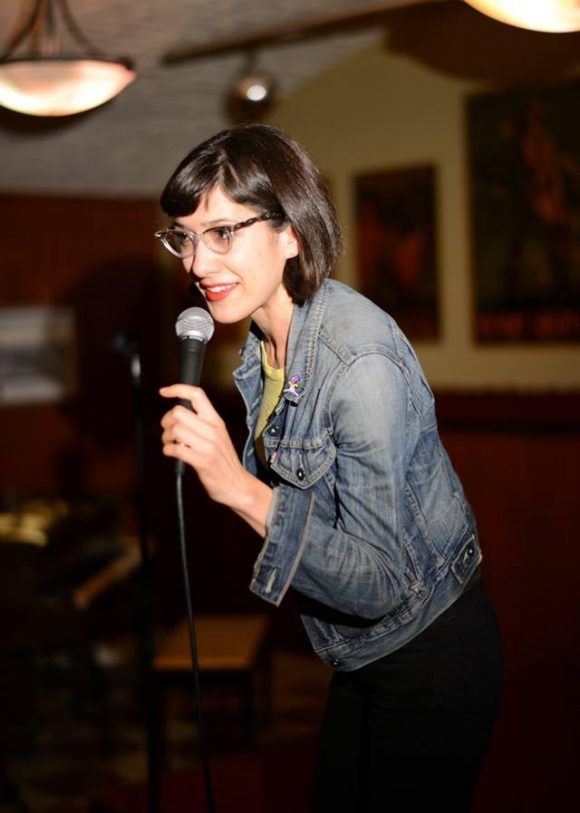
Julia performing stand-up.
How does screenwriting differ from writing stand-up? Do you prefer one over the other?
Oh I’m a MUCH BETTER screenwriter than a stand-up haha. I feel I understand the rhythms and processes much better when I’m developing a story vs. developing a stand-up bit. For me, writing stand-up really hinges on the in-the-moment inspiration for a bit to really form and take flight. I’ll riff with a friend in a conversation and it feels funny enough and strong enough to be a premise for a joke. I’ll be driving somewhere, and my focused mind will open itself to a detail or curious thing that happened to me that I think can be funny. That’s the majority of what my stand-up writing was like pre-pandemic. Though of course, sometimes I would sit and try to focus on one topic and see how many premises I can shape out of it — like a thought tree experiment. My main goal with stand-up was just connecting to an audience and having a conversation that felt fluid. I feel like my “stand-up persona” was very “it’s me, your friend Julia”. I wanted to hit on the same absurd life things the audience was thinking. I just wanted to laugh it all away — the absurd, the tragedy and poking fun at my own silliness for thinking this hard about these topics that “don’t technically matter”, anyway.
One lesson I feel can be applied to both stand-up and screenwriting is staying away from using pop culture references as “the punchline” (like the simple reference should be what’s “funny” about it) as well as referencing news stories that time stamp it. It’ll just give your material a short shelf-life and stifles your own creativity with creating your own jokes and premises.
Did you ever experience self-doubt going into such a competitive industry? How do you handle that?
Oh HELLO, have we met? To be a professional creative is to have imposter syndrome. It took me years to convince myself the truth — which is, that everyone in this town plays a different “instrument in the band”. Even when I overhear that someone else is writing a pilot premise that’s a little like mine, I used to freak out — now I tell myself, “Well, their version of this story could in no way be exactly similar to my version of it.” Even if you hand-delivered the same core premise to two writers, they’d attempt the script in completely different ways. That’s just a fact!
I feel similar in writers rooms. I used to think to myself, “Damn. This person writes the best nonsensical jokes that always get a big laugh, why can’t I write the same kind of jokes?” And I had to keep telling myself, “Julia — it’s because HE’S GOOD AT WRITING THOSE KINDS OF JOKES. You’re good at writing YOUR kind of jokes.” At the end of the day, you just must trust that you’ve been hired for a reason.
And– if you don’t have the “you’ve been hired for a reason” thing to point to because (well) you haven’t been hired, trust that your writing and what you genuinely think is great, funny, and honest is gonna be a bat signal to other people who think and speak similarly. I can’t tell you how many times I’ve tried my damndest to appease the Hollywood gatekeepers only to have what I wrote to appease them completely, absolutely bomb. And you know what? They were right! I shouldn’t have been wasting my time writing something I thought OTHER PEOPLE would like and I wasn’t particularly stoked for. You can really smell it off the page when a writer doesn’t fully care about the world and the characters and the story.
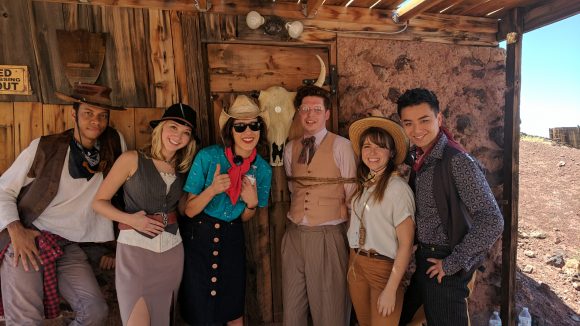
On set of her hit Blackpills series TOWNIES.
So I just started writing pilots and features that I wanted to see and really didn’t care what would happen beyond the point of writing “THE END.” It’s extremely hard getting past the mindset of, “This is my JOB and I better write things that people will PAY ME FOR because I have to EAT.” I don’t think I ever fully get away from that thinking, but I try my best to step away from it long enough to genuinely not pay much mind to what’ll happen beyond finishing and ya know what? I always finish in this case!
What’s the best lesson you’ve learned from working in the industry?
Focus on what you can control — surround yourself with serious people who inspire you to be great — half of being a professional writer is “being able to hang”. Don’t be a dick and most importantly — you ain’t owed shit. (I forgot to ask, can we curse in this? haha). Oh one more — we’re all gonna die and this is all very silly so you might as well have fun (too dark?).
What has it been like returning to Chapman to teach?
Amazing. My first group of students were all amazing. It’s gonna be an incredibly tough bar to hit for the next round.
What advice would you give to aspiring writers? Any advice you’d give to your college self?
Everything I’ve previously said but also — if you’re in college right now and you’re reading this (which I assume) and you wanna be a writer, DON’T WORRY ABOUT IT. You’re already a writer. You write and that makes you a writer. I spent far too much of my adult life waiting for someone to “knight me” and grant me the permission of a title. Literally no one outside of your brain cares about all the reasons you can name that makes you “not a writer”. The lack of a professional resume, the lack of Industry connections. Honestly, when you get to a certain point you’ll learn that taking several detours to get where you wanna go is PREFERRED. It proves you’ve LIVED and thus have a plethora of stories to mine for future scripts.
Apart from that, I would say WRITE WRITE WRITE. Every time you open Final Draft, you become a better writer. Every. Single. Time. I do this thing called “Trash Draft” that I’ve taught off/on for about 5 years. Students sign-up and I guide them through writing a script in a week. They pitch their pilot on the first day, get feedback from the class, go off and write the outline + script and then 7 days later, we do a marathon read-through. I can’t tell you how many ‘Trash Draft scripts’ I have laying around in digital drawers I haven’t opened since I wrote them. So many ideas or takes on ideas that at the end of the road I’ve gone, “Whoa, okay. Not THIS. Burn THIS.” But even still, I knew I was becoming a better writer. Whether it was allowing me to explore a path to an idea all to realize “okay, this is the ABSOLUTE WRONG PATH” thus opening up the RIGHT path or just taking my overthinking out of it and allowing me to write.
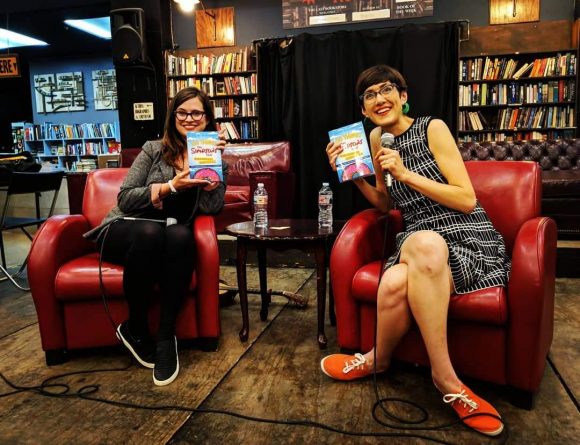
Reading of her co-authored book “100 Things Simpsons Fans Should Know and Do Before They Die.”
Generally, the more time you spend in Final Draft (or the screenwriting software of your choice), the stronger your instincts become and in writing (especially comedy writing) it’s all about instincts. Where a joke should go, how dialogue should play out, where to place all the SMASH TO’s and WIDEN OUT TO REVEAL to land the perfect momentum for your storytelling. The same is sharpened in stand-up — it’s all about comedy muscle memory and finding the musical rhythm of what you should do with your inflections and your hands and your tone.


